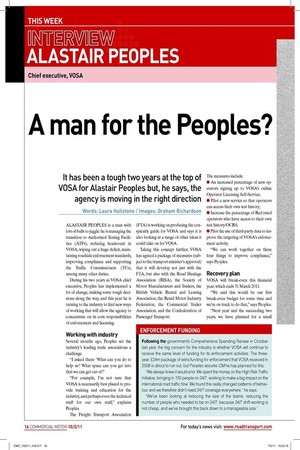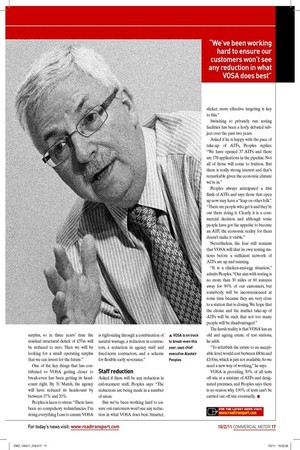A man for the Peoples?
Page 12

Page 13

If you've noticed an error in this article please click here to report it so we can fix it.
It has been a tough two years at the top of VOSA for Alastair Peoples but, he says, the agency is moving in the right direction
Words: Laura Hailstone / Images: Graham Richardson
ALASTAIR PEOPLES is a man with lots of balls to juggle: he is managing the transition to Authorised Testing Facilities (ATFs), reducing headcount in VOSA, wiping out a huge deicit, maintaining roadside enforcement standards, improving compliance and supporting the Trafic Commissioners (TCs), among many other duties.
During his two years as VOSA chief executive, Peoples has implemented a lot of change, making some tough decisions along the way, and this year he is turning to the industry to ind new ways of working that will allow the agency to concentrate on its core responsibilities of enforcement and licensing.
Working with industry
Several months ago, Peoples set the industry’s leading trade associations a challenge.
“I asked them: ‘What can you do to help us? What space can you get into that we can get out of?’ “For example, I’m not sure that VOSA is necessarily best placed to provide training and education for the industry, and perhaps even the technical stuff for our own staff,” explains Peoples.
The Freight Transport Association (FTA) is working on producing the conspicuity guide for VOSA and says it is also looking at a range of other ideas it could take on for VOSA.
Taking this concept further, VOSA has agreed a package of measures (subject to the transport minister’s approval) that it will develop not just with the FTA, but also with the Road Haulage Association (RHA), the Society of Motor Manufacturers and Traders, the British Vehicle Rental and Leasing Association, the Retail Motor Industry Federation, the Commercial Trailer Association, and the Confederation of Passenger Transport. The measures include: ● An increased percentage of new operators signing up to VOSA’s online Operator Licensing Self-Service; ● Pilot a new service so that operators can access their own test history; ● Increase the percentage of Red rated operators who have access to their own test history/OCRS; ● Pilot the use of third-party data to improve the targeting of VOSA’s enforcement activity.
“We can work together on these four things to improve compliance,” says Peoples.
Recovery plan
VOSA will break-even this inancial year, which ends 31 March 2011.
“We said this would be our irst break-even budget for some time and we’re on track to do that,” says Peoples.
“Next year and the succeeding two years, we have planned for a small surplus, so in three years’ time the residual structural deicit of £37m will be reduced to zero. Then we will be looking for a small operating surplus that we can invest for the future.” One of the key things that has contributed to VOSA getting closer to break-even has been getting its headcount right. By 31 March, the agency will have reduced its headcount by between 17% and 20%.
Peoples is keen to stress: “There have been no compulsory redundancies. I’m doing everything I can to ensure VOSA is right-sizing through a combination of natural wastage, a reduction in contractors, a reduction in agency staff and ixed-term contractors, and a scheme for lexible early severance.”
Staff reduction
Asked if there will be any reduction in enforcement staff, Peoples says: “The reductions are being made in a number of areas.
But we’ve been working hard to ensure our customers won’t see any reduction in what VOSA does best. Smarter, slicker, more effective targeting is key to this.” Switching to privately run testing facilities has been a hotly debated subject over the past two years.
Asked if he is happy with the pace of take-up of ATFs, Peoples replies: “We have opened 37 ATFs and there are 178 applications in the pipeline. Not all of those will come to fruition. But there is really strong interest and that’s remarkable given the economic climate we’re in.” Peoples always anticipated a irst lush of ATFs and says those that open up now may have a “leap on other folk”. “There are people who get it and they’re out there doing it. Clearly it is a commercial decision and although some people have got the appetite to become an ATF, the economic reality for them doesn’t make it viable.” Nevertheless, the fear still remains that VOSA will shut its own testing stations before a suficient network of ATFs are up and running.
“It is a chicken-and-egg situation,” admits Peoples. “Our aim with testing is no more than 30 miles or 60 minutes away for 90% of our customers, but somebody will be inconvenienced at some time because they are very close to a station that is closing. We hope that the choice and the market take-up of ATFs will be such that not too many people will be disadvantaged.” The harsh reality is that VOSA has an old and ageing estate of test stations, he adds.
“To refurbish the estate to an acceptable level would cost between £80m and £100m, which is just not available. So we need a new way of working,” he says.
VOSA is providing 30% of all tests off site at a mixture of ATFs and designated premises, and Peoples says there is no reason why 100% of tests can’t be carried out off site eventually. ■





































